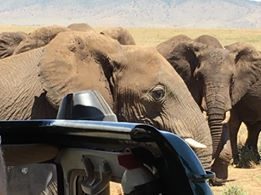
COVID 19’s effect on the world is unprecedented. Every industry is experiencing its impact. As a safari planning specialist for the past 2 decades, I have intimate insight into the devastation caused by Covid 19 on the African safari business in particular.
On my beach walk this morning I stopped to chat with a philanthropist friend who shares my passion for Africa. “There’s a massive need there right now, and I don’t know how to help,” she said.
I told her what I’m going to tell you.
What I think is the most effective way to help Africa’s people, its wild places, and its animals. How to best protect rhino and elephant from poachers, to convert areas from hunting with guns to hunting with cameras, and support the local communities that are protecting those animals.
To truly have an impact.
The best remedy is to go on an African safari.
Why?
Because the money you pay for your African safari trickles down. It goes from the lodge to the staff who cook, clean, and care for your every need, to the driver/guide- your teacher and protector in the bush, to the local man selling produce to the lodge for your lunch, to the anti-poaching rangers protecting rhino, elephant, pangolin, and lions. In many areas, your money also pays a lease fee to the local community. Like the Masai in Kenya’s Masai Mara Reserve. Those funds then help support every man, woman, and child in that area. That support in turn acts as an incentive to those same local people to protect the wild places and wild beings that tourists pay to experience. It comes full circle.
It’s a win-win for everyone involved.
Of course, this trickle-down effect works in the opposite direction as well. Africa is experiencing that right now from COVID 19. Every safari trip I’ve booked for clients in 2020 has been or will be, rescheduled for 2021. That means there’s no safari money circulating through that complex, wonderfully supportive system this year, except for deposits the clients had paid pre-COVID 19.
The good news – Most people are postponing their safari plans, and not outright canceling them. Deposits from those trips, as well as money from new bookings, are providing much-needed confidence and funds to the safari industry during this critical time. It enables African safari operators and lodges to keep local people employed and conservation projects afloat while waiting for things to return to ‘normal’.
A Surprising Way Safaris Helps protect Wildlife
Tourists roaming around the Parks looking at wildlife is a great deterrent to poachers. COVID 19 restrictions are leaving Parks empty and more vulnerable. One bit of good news though from COVID as it relates to poaching is that travel bans are preventing the products – horn, tusk, skin, etc. – from export.
Going on a safari is also a great choice if you want a vacation but are now squeamish about booking a cruise, sightseeing in places with huge crowds, or standing in long lines at museums and entertainment parks. An African safari has always been a place for people wanting space, privacy, and remoteness. Now more than ever, it’s an ideal choice for a special destination.
I would love to help you figure out the perfect itinerary for your safari. If you want to go to Africa within the next year or two don’t delay in starting to make your safari arrangements. My favorite camps are almost completely booked for 2021 because of adding all of the 2020 guests to the booking schedules. It’s not too early to make your bookings for 2022. Contact me to get the conversation started.
